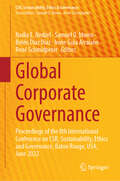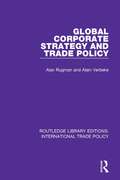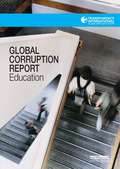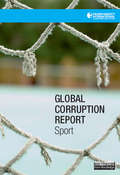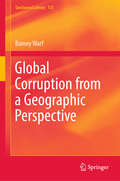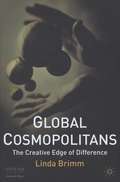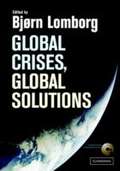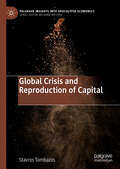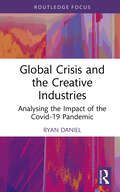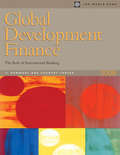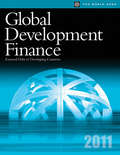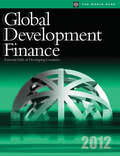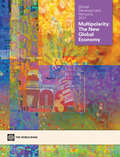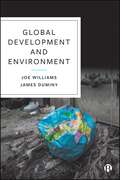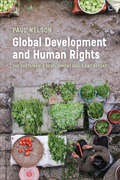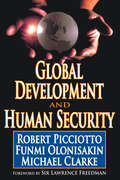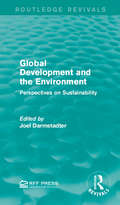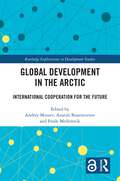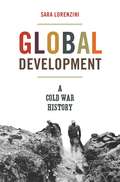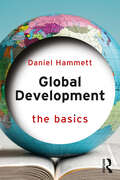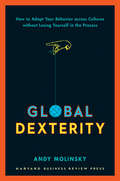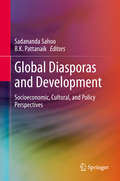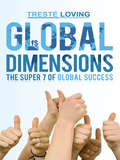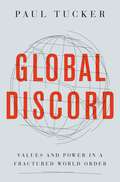- Table View
- List View
Global Corporate Governance: Proceedings of the 8th International Conference on CSR, Sustainability, Ethics and Governance, Baton Rouge, USA, June 2022 (CSR, Sustainability, Ethics & Governance)
by Samuel O. Idowu René Schmidpeter Nadia E. Nedzel Irene Guia Arraiano Belén Diaz DiazThis book gathers selected contributions from the 8th Annual Global Corporate Governance Institute, a hybrid conference held in Baton Rouge, Louisiana, on June 8–10, 2022. The chapters present the work of internationally respected scholars and experts, focusing on corporate social responsibility, sustainability, ethics, corporate governance, finance, and responsible investing. In this context, it highlights the latest research findings on responsible action and their practical implications for business, society, science, and politics. The results of the empirically and theoretically based contributions offer a unique and multi-faceted perspective on current global trends and expected developments in this area. Accordingly, the book offers a valuable resource for academics, policymakers, and practitioners who want to drive effective change to tap their organizations&’ full potential.
Global Corporate Strategy and Trade Policy (Routledge Library Editions: International Trade Policy #12)
by Alain Verbeke Alan M. RugmanAt the end of the twentieth century, international business functioned in an environment dominated by the triad of economic power formed by the USA, Japan and the European Community. Multinational corporate strategies had to be formulated within the context of intense global competition between these three economic blocs. This book, first published in 1990, analyses the interplay between the trade policies adopted by the major powers and the competitive strategies of international corporations. With particular reference to trade relations between Canada and the USA, the effects of Japanese multinational dominance and the implications of European economic integration, this volume throws new light on the interaction between international business and government trade policies.
Global Corruption Report: Education
by Transparency InternationalCorruption and poor governance are acknowledged as major impediments to realizing the right to education and to reaching the Millennium Development Goal of universal primary education by 2015. Corruption not only distorts access to education, but affects the quality of education and the reliability of research findings. From corruption in the procurement of school resources and nepotism in the hiring of teachers, to the buying and selling of academic titles and the skewing of research results, major corruption risks can be identified at every level of the education and research systems. Conversely, education serves as a means to strengthen personal integrity and is a critical tool to address corruption effectively. The Global Corruption Report (GCR) is Transparency International’s flagship publication, bringing the expertise of the anti-corruption movement to bear on a specific corruption issue or sector. The Global Corruption Report on education consists of more than 70 articles commissioned from experts in the fields of corruption and education, from universities, think-tanks, business, civil society and international organisations. The Global Corruption Report on education and academic research will provide essential analysis for understanding the corruption risks in the sector and highlight the significant work that has already been done in the field to improve governance and educational outcomes. This will be an opportunity to pull together cutting edge knowledge on lessons learnt, innovative tools and solutions that exist in order to fight corruption in the education sector.
Global Corruption Report: Sport
by Transparency InternationalSport is a global phenomenon engaging billions of people and generating annual revenues of more than US$ 145 billion. Problems in the governance of sports organisations, fixing of matches and staging of major sporting events have spurred action on many fronts. Yet attempts to stop corruption in sport are still at an early stage. The Global Corruption Report (GCR) on sport is the most comprehensive analysis of sports corruption to date. It consists of more than 60 contributions from leading experts in the fields of corruption and sport, from sports organisations, governments, multilateral institutions, sponsors, athletes, supporters, academia and the wider anti-corruption movement. This GCR provides essential analysis for understanding the corruption risks in sport, focusing on sports governance, the business of sport, planning of major events, and match-fixing. It highlights the significant work that has already been done and presents new approaches to strengthening integrity in sport. In addition to measuring transparency and accountability, the GCR gives priority to participation, from sponsors to athletes to supporters an essential to restoring trust in sport.
Global Corruption from a Geographic Perspective (GeoJournal Library #125)
by Barney WarfThis monograph explores the nature of corruption around the world from a geographic perspective. It focuses on historical context and cultural factors. Readers will learn that though corruption is pervasive, geography greatly shapes its character. This book will offer a better understanding of the level of corrupt activity in any given country. The book analyzes an array of countries and regions. Coverage ranges from democratic societies, where corruption is low due to high rates of literacy and a free press, to the most corrupt places, where centralized power structures and lack of a free media allow corruption to unfold unimpeded. Anti-corruption campaigns and their effectiveness are also reflected upon. In addition to data from Transparency International, the text examines relevant political events. In each case, the analysis focuses on the major actors and institutions involved; the cultural norms that often regard corruption as a normal part of doing business; and the attempts by foreign and domestic actors to minimize corruption. This book will help readers better understand the causes and consequences of corruption, as well as its type and severity varies widely across the planet. It will appeal to students, researchers, policy makers, and interested general readers.
Global Cosmopolitans
by Linda BrimmAs globalization creates the need for leaders who transcend national borders, this book provides an insider's view of what makes them special. This is the first book to present a framework for understanding this fast-growing and influential group and it provides tools for readers to discover their own inner competitive edge.
Global Crises, Global Solutions: Costs and Benefits
by Bjørn LomborgLomborg (statistics, U. of Aarhus) explores ten of the most serious challenges facing the world today: climate change, communicable diseases, conflicts and arms proliferation, access to education, financial instability, governance and corruption, malnutrition and hunger, migration, sanitation and access to clean water, and subsidies and trade barriers. He provides arguments and data for this set of problems and hopes to help in prioritizing responses. Each issue is introduced by an expert who defines the scale of the problem and describes the cost and benefits of a range of policy options. Two sets of alternative perspectives are included with the proposals, and eight economists rank the options and evaluate the the policy proposals. Annotation ©2004 Book News, Inc., Portland, OR (booknews.com)
Global Crisis and Reproduction of Capital (Palgrave Insights into Apocalypse Economics)
by Stavros TombazosThis Palgrave Pivot uses Marxian economic categories and analysis to explore the deeper causes of the 2008 global economic crisis, what the crisis represents for capitalism, and why fiscal and monetary policies pursued in its wake have failed to rejuvenate economies.With an innovative interpretation of the crisis and a focus on 'toxic capital’ – a sub-division of Karl Marx’s concept of fictitious capital – Tombazos examines the specificities of economic reproduction under neoliberalism and financialisation.
Global Crisis and the Creative Industries: Analysing the Impact of the Covid-19 Pandemic (Routledge Focus on the Global Creative Economy)
by Ryan DanielWorkers in the creative industries are highly motivated, resilient, and innovative and these characteristics have come to the fore during the global health and resultant economic crises enveloping the world. This shortform book analyses transformation in the arts as a result of this era of polycrisis. The author interrogates public policy, legislative developments, and financial support systems to assist the arts sector around the world. Utilising interview responses from various artis and creatives, the book takes the impact of the Covid-19 pandemic on the global creative industries as its central case study. It looks at the historical relationship between art and times of global crises, the policy initiatives implemented around the world in response to Covid-19 to rescue and support creative industries, explores the ways in which audiences, artists, and creatives responded during the first year of the pandemic, and looks towards future opportunities for the creative industries sector. The book also highlights the importance of higher education for the future creative industries workforce. Providing a concise, yet holistic interpretation of the early impact of the pandemic, the book summarises recent developments, and proposes future directions relevant to students and scholars involved in the creative economy.
Global Development Finance 2008
by World Bank'Global Development Finance' - the World Bank's annual report on the external financing of developing countries - provides monitoring and analysis of development finance, identifying key emerging trends and policy challenges in international financial flows that are likely to affect the growth prospects of developing countries. As major financial institutions currently recognize losses from the U.S. subprime mortgage market crisis and rebuild their balance sheets through a more conservative approach to lending and risk management, the central theme of this year's report will be the market for international bank credit to developing countries.It is an indispensable resource for governments, economists, investors, financial consultants, academics, bankers, and the entire development community. 'Vol I: Analysis and Outlook' reviews recent trends in financial flows to developing countries. 'Vol II. Summary and Country Tables'* includes comprehensive data for 138 countries, as well as summary data for regions and income groups. Also available on CD-ROM, with more than 200 historical time series from 1970 to 2006, and country group estimates for 2007. * 'Vol II. Summary and Country Tables' not sold separately.
Global Development Finance 2011
by The World BankGlobal Development Finance 2011: External Debt of Developing Countries is a continuation of the World Bank's publications Global Development Finance, Volume II (1997 through 2009) and the earlier World Debt Tables (1973 through 1996). As in previous years, GDF 2011 provides statistical tables showing the external debt of 128 developing countries that report public and publicly guaranteed external debt to the World Bank's Debtor Reporting System (DRS). It also includes tables of key debt ratios for individual reporting countries and the composition of external debt stocks and flows for individual reporting countries and regional and income groups along with some graphical presentations. GDF 2011 draws on a database maintained by the World Bank External Debt (WBXD) system. Longer time series and more detailed data are available from the Global Development Finance 2011 on CD-ROM and the World Bank open databases, which contain more than 200 time series indicators, covering the years 1970 to 2009 for most reporting countries, and pipeline data for scheduled debt service payments on existing commitments to 2017. The database covers external debt stocks and flows, major economic aggregates, and key debt ratios, as well as average terms of new commitments, currency composition of longterm debt, and debt restructurings in greater detail than can be included in the GDF book. The CD-ROM also contains the full contents of the print version of GDF 2011. Text providing country notes, definitions, and source information is linked to each table. World Bank open databases are available through the World Bank's website data.worldbank.org. The Little Data Book on External Debt 2011 provides a quick reference to the data from GDF 2011. For more information on the GDF database, visit http://data.worldbank.org/data-catalog. Global Development Finance 2011: External Debt of Developing Countries is unique in its coverage of the important trends and issues fundamental to the financing of the developing world. This report is an indispensible resource for governments, economists, investors, financial consultants, academics, bankers, and the entire development community.
Global Development Finance: External Debt of Developing Countries
by the editors at The World BankGlobal Development Finance 2011: External Debt of Developing Countries is a continuation of the World Bank’s publications Global Development Finance, Volume II (1997 through 2009) and the earlier World Debt Tables (1973 through 1996). As in previous years, GDF 2011 provides statistical tables showing the external debt of 128 developing countries that report public and publicly guaranteed external debt to the World Bank’s Debtor Reporting System (DRS). It also includes tables of key debt ratios for individual reporting countries and the composition of external debt stocks and flows for individual reporting countries and regional and income groups along with some graphical presentations. GDF 2011 draws on a database maintained by the World Bank External Debt (WBXD) system. Longer time series and more detailed data are available from the Global Development Finance 2011 on CD-ROM and the World Bank open databases, which contain more than 200 time series indicators, covering the years 1970 to 2009 for most reporting countries, and pipeline data for scheduled debt service payments on existing commitments to 2017. The database covers external debt stocks and flows, major economic aggregates, and key debt ratios, as well as average terms of new commitments, currency composition of longterm debt, and debt restructurings in greater detail than can be included in the GDF book. The CD-ROM also contains the full contents of the print version of GDF 2011. Text providing country notes, definitions, and source information is linked to each table. Global Development Finance 2011: External Debt of Developing Countries is unique in its coverage of the important trends and issues fundamental to the financing of the developing world. This report is an indispensible resource for governments, economists, investors, financial consultants, academics, bankers, and the entire development community.
Global Development and Environment
by Joe Williams James DuminyAvailable open access digitally under CC-BY licence. Development and environmental challenges are often framed at the global or planetary scale, but in a vague or apolitical manner. This book develops a theoretically rigorous and politicized concept of the planetary to intervene in contemporary debates on global development and to enhance our critical understanding of development as we approach the second quarter of the twenty-first century. Chapters explore key themes and processes including urbanization, demographic change, health, financialization, and infrastructure development. Referencing diverse cases and examples drawn from across the world, the book argues that the futures of global development are inseparable from environmental challenges and transformations.
Global Development and Human Rights: The Sustainable Development Goals and Beyond (UTP Insights)
by Paul NelsonFrom 2000 to 2015 the Millennium Development Goals (MDGs) mobilized external aid to finance life-changing services in the global South. However, in doing so, the organization failed to meet the challenges often associated with human rights initiatives, which are to make underprivileged communities independently prosperous, equitable, and sustainable. In Global Development and Human Rights, Paul Nelson assesses the current thirty-year effort to make transformative changes in the global South by exploring how this disconnect from human rights weakened the MDGs reputation as a successful aid organization. To overcome the failings of the MDGs, the Sustainable Development Goals (SDGs) were formed in 2016 with the intention of managing the issues fundamentally ignored by the MDGs. Drawing on twenty-five years of research on development goals, human rights, and the organizations that promote them, Nelson reasons that transformative change arises out of national and local movements, and shows how human rights can offer leverage and political support that help drive transformative national initiatives.
Global Development and Human Security
by Robert PicciottoGlobal Development and Human Security explores the possibility of connecting all countries to the global economy while defusing the social tensions and managing the security risks that can result from exposure to a turbulent international system. The complex intersection between security and development policies has not been adequately mapped or explored. Frail and failing states that lack sound market and security institutions are the weak links in an interconnected global system. Yet aid allocation principles discourage engagement with these "difficult partners," and the insular culture of development assistance hinders interaction with the security community. In a world beset by "problems without passport" (infectious diseases, environmental pollution, international crime, conflict spillovers, terrorism, etc.), a new paradigm should supplant the now obsolete development consensus.The authors took stock of current development practices through the prism of Sweden's Shared Responsibility bill, which addresses peace, security, opportunity, environmental conservation, human rights, and democracy. The resulting volume draws the implications of emerging threats to global peace and prosperity for development policy and practice. It seeks to build bridges of understanding between the development community and the security establishment by bringing together lessons of experience currently scattered in the literature. Each chapter is self-contained and includes policy findings and recommendations.The book is principally aimed at practitioners who need up-to-date knowledge about security and development issues. Publication of this paperback edition makes the book available for use as an introductory text for security specialists with little knowledge of development or for development specialists with limited knowledge of security, or for college or university students in these areas.
Global Development and the Environment: Perspectives on Sustainability (Routledge Revivals)
by Joel DarmstadterIn preparation for the United Nation’s Conference on Environment and Development in Rio de Janeiro in June 1992, this study aimed to detail enduring environmental issues that might or might not have been considered at the conference. Originally published earlier that year, Global Development and the Environment questions the compatibility of goals for environmental protection, natural resource consequences and economic growth in relation to sustainability with essays on important topics such as biodiversity, agriculture and population issues. This title will be of interest to students of Environmental Studies and Economics.
Global Development in the Arctic: International Cooperation for the Future (Routledge Explorations in Development Studies)
by Anatoli Bourmistrov Frode Mellemvik Andrey MineevViewing the Arctic as a key region for global development in the 21st century, this book offers a cross-disciplinary conceptual framework for understanding what international cooperation is, why it is difficult and what kind of alternative views can apply in the Arctic. Written by Arctic experts, the book presents major trends and scenarios for international cooperation in the Arctic up to 2035 and future prospects for international cooperation in the Arctic in various sectors: energy, business and economy, transportation and logistics, climate change, diplomacy and security, culture, innovations, higher education and research. Implications of the scenarios for global development are discussed in the light of the United Nations Agenda for Global Development and Sustainable Development Goals (SDGs). The book offers a cross-disciplinary conceptual framework of international cooperation in the Arctic and discusses implications of this framework for global development. Filling the gap in analytical understanding of international cooperation, this book will be of interest to academics, students and professionals concerned with global development and the Arctic region.
Global Development: A Cold War History (America in the World #38)
by Sara LorenziniIn the Cold War, "development" was a catchphrase that came to signify progress, modernity, and economic growth. Development aid was closely aligned with the security concerns of the great powers, for whom infrastructure and development projects were ideological tools for conquering hearts and minds around the globe, from Europe and Africa to Asia and Latin America. In this sweeping and incisive book, Sara Lorenzini provides a global history of development, drawing on a wealth of archival evidence to offer a panoramic and multifaceted portrait of a Cold War phenomenon that transformed the modern world.Taking readers from the aftermath of the Second World War to the tearing down of the Berlin Wall, Lorenzini shows how development projects altered local realities, transnational interactions, and even ideas about development itself. She shines new light on the international organizations behind these projects—examining their strategies and priorities and assessing the actual results on the ground—and she also gives voice to the recipients of development aid. Lorenzini shows how the Cold War shaped the global ambitions of development on both sides of the Iron Curtain, and how international organizations promoted an unrealistically harmonious vision of development that did not reflect local and international differences.An unparalleled journey into the political, intellectual, and economic history of the twentieth century, this book presents a global perspective on Cold War development, demonstrating how its impacts are still being felt today.
Global Development: The Basics (The Basics)
by Daniel HammettHow do we try to make the world a better place, when the challenges of poverty, disease, war, conflict, and climate change continue to impact millions of lives? Global Development: The Basics is a lively and engaging introduction to the shifting landscape of global development, right from its origins, to present-day problems, and on to what the future for global development might look like. Recognising global development as an economic, political, and social project, this book tackles a series of critical questions: asking ‘what’ development is and how it is measured, where and to whom it is assumed to happen, how its approaches are developed, and whose benefit do they serve? The book invites readers to consider the complexities and challenges of the concept of development, including its historical roots in colonialism, and the geopolitical power relations which continue to set much of the agenda. It investigates whose voices are included or silenced in dominant approaches to development, and the growing importance of ‘non-traditional’ development funding and approaches. Covering key topics in the field, from economics and politics, through to gender and climate change, Global Development: The Basics is perfect for readers starting out in their understanding of global development.
Global Dexterity
by Andy Molinsky"I wrote this book because I believe that there is a serious gap in what has been written and communicated about cross-cultural management and what people actually struggle with on the ground."-From the IntroductionWhat does it mean to be a global worker and a true "citizen of the world" today? It goes beyond merely acknowledging cultural differences. In reality, it means you are able to adapt your behavior to conform to new cultural contexts without losing your authentic self in the process. Not only is this difficult, it's a frightening prospect for most people and something completely outside their comfort zone.But managing and communicating with people from other cultures is an essential skill today. Most of us collaborate with teams across borders and cultures on a regular basis, whether we spend our time in the office or out on the road. What's needed now is a critical new skill, something author Andy Molinsky calls global dexterity.In this book Molinsky offers the tools needed to simultaneously adapt behavior to new cultural contexts while staying authentic and grounded in your own natural style. Based on more than a decade of research, teaching, and consulting with managers and executives around the world, this book reveals an approach to adapting while feeling comfortable-an essential skill that enables you to switch behaviors and overcome the emotional and psychological challenges of doing so.From identifying and overcoming challenges to integrating what you learn into your everyday environment, Molinsky provides a guidebook-and mentoring-to raise your confidence and your profile. Practical, engaging, and refreshing, Global Dexterity will help you reach across cultures-and succeed in today's global business environment.
Global Diasporas and Development
by Sadananda Sahoo B. K. PattanaikThis volume discusses how diasporas have evolved and engaged in economic, social and cultural domains of their host and home countries across the globe. The volume is divided into six parts: Issues, Challenges and Development Experiences; Diaspora Finance and Economic Development; Knowledge Transfer and Diasporas; The Politics of Inclusion and Exclusion; Gender and Diasporas; and Representation in Film, Theatre and Literature. It is truly a global representation of diasporic engagement. Its contributions come from experts in various disciplines across the globe, and the chapters cover socioeconomic, policy-related and cultural elements in countries as far apart as New Zealand and Zimbabwe. The contributors discuss major issues related to local communities' engagement with the diaspora and diaspora--home relations in Africa, West Asia, South and South-east Asia, Australia and New Zealand, China, and the USA, providing a panoramic view of diasporic flows in the twenty-first century. The interdisciplinary thrust of the volume, together with its global focus, makes this volume useful to researchers, academics and experts from the social sciences, population sciences and development studies, as also to analysts and policymakers across the world.
Global Digital Technology Convergence: Driving Diffusion via Network Effects (ISSN)
by Ewa Lechman Adam MarszkSince the 1970s, we have witnessed unprecedented diff usion of digital technologies in both speed and geographic coverage. These technologies are pervasive and disruptive, and lead to profound shifts and transformations in societies and economies. Many claim that emerging network externalities are the principal phenomenon driving the process of technology diff usion and determining its in-time dynamics.This book analyzes the unique role network eff ects play in the process of digital technology diff usion. Using the time span of 1980–2022 and data from over 180 countries, the authors examines the strength and determinants of emerging network externalities in the process of digital technology diffusion across the world. Moreover, using international case studies it traces the process of technology convergence and technology convergence club formation, intending to answer whether cross-country gaps are diminishing or rather growing, and if countries form unique ‘clubs’ within which a rapid convergence occurs.Global Digital Technology Convergence is written for scholars and researchers in the fi elds of technology and innovation management, information and communication technology, economic development and the economics of innovation.
Global Dimensions: The Super 7 of Global Success
by Tresté LovingYOU WANT THIS BOOK IF… → You do business globally and want to make a momentous impact on the market. → Your organization is working on their fi rst diversity strategy. → You are a CEO or Business Owner who wants to create a more productive, talent rich, inclusive culture. → You are a Business Owner or CEO who desire straight answers to difficult and uneasy topics. → You are a CEO or Business Owner who wants to learn new concepts that inspire a positive work environment. CEO’s and Business Owners will fi nd the distinctive of each employee is what really leads to increased productivity, reduced confl ict, increased customer service, increased talent retention, and more. This book provides business executive’s ways to integrate their employee’s unique attributes to achieve business objectives; new adaptability ideas, and a team based environment working together accomplishing the mission and vision of the organization. Global Dimensions: The Super 7 of Global Success is the key diversity source for CEO’s, Business Owners, and Senior Executives, regardless of their employee’s race, ethnic group, gender, religion, culture, age, or language. A Business Owner or CEO wanting to take their organization to a phenomenal level in today’s global market defi nitely has the information they need by reading this book. Tresté Loving’s experience and training in race issues and other poor work environmental situations is crucial to organizations’amazing results. Her work has been covered in the Washington Post and she has answered many Congressional Inquiries. Tresté’s passion is to help every organization be awesome in all aspects of their business. She desires to make this a reality in your organization.
Global Discord: Values and Power in a Fractured World Order
by Paul TuckerHow to sustain an international system of cooperation in the midst of geopolitical struggleCan the international economic and legal system survive today’s fractured geopolitics? Democracies are facing a drawn-out contest with authoritarian states that is entangling much of public policy with global security issues. In Global Discord, Paul Tucker lays out principles for a sustainable system of international cooperation, showing how democracies can deal with China and other illiberal states without sacrificing their deepest political values. Drawing on three decades as a central banker and regulator, Tucker applies these principles to the international monetary order, including the role of the U.S. dollar, trade and investment regimes, and the financial system.Combining history, economics, and political and legal philosophy, Tucker offers a new account of international relations. Rejecting intellectual traditions that go back to Hobbes, Kant, and Grotius, and deploying instead ideas from David Hume, Bernard Williams, and modern mechanism-design economists, Tucker describes a new kind of political realism that emphasizes power and interests without sidelining morality. Incentives must be aligned with values if institutions are to endure. The connecting tissue for a system of international cooperation, he writes, should be legitimacy, creating a world of concentric circles in which we cooperate more with those with whom we share the most and whom we fear the least.
